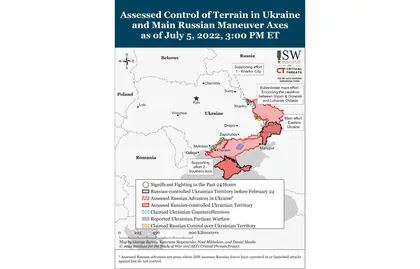Key Takeaways
- Russian Security Council Secretary Nikolai Patrushev restated Russian President Vladimir Putin’s initial objectives for operations in Ukraine, suggesting that the Kremlin retains maximalist objectives including regime change and territorial expansion far beyond the Donbas.
- Russian forces continued offensive operations northwest and east of Slovyansk.
- Russian forces are attempting to advance west of the Lysychansk area toward Siversk.
- Russian forces are likely attempting to gain access to village roads southeast of Bakhmut in order to advance on the city from the south.
- Ukrainian forces conducted a limited counterattack southwest of Donetsk City.
- Russian forces continued limited and unsuccessful assaults in northern Kharkiv Oblast.
- Russian authorities are conducting escalated conscription measures in occupied territories to compensate for continuing manpower losses.
- Russian authorities are continuing to consolidate administrative control of occupied areas of Ukraine, likely to set conditions for the direct annexation of these territories to the Russian Federation.
Russia’s stated objectives in its invasion of Ukraine remain regime change in Kyiv and the truncation of the sovereignty of any Ukrainian state that survives the Russian attack despite Russian military setbacks and rhetoric hinting at a reduction in war aims following those defeats.
JOIN US ON TELEGRAM
Follow our coverage of the war on the @Kyivpost_official.
Russian Security Council Secretary Nikolai Patrushev stated on July 5 that the Russian military operation in Ukraine will continue until Russia achieves its goals of protecting civilians from “genocide,” “denazifying” and demilitarizing Ukraine, and obliging Ukraine to be permanently neutral between Russia and NATO—almost exactly restating the goals Russian President Vladimir Putin announced in his February 24 speech justifying the war. Putin had stated that the operation aimed to protect civilians from humiliation and genocide, demilitarize and denazify Ukraine, and prosecute genocidal perpetrators. Patrushev’s explicit restatement of Putin‘s initial objectives, nearly five months later, strongly indicates that the Kremlin does not consider recent Russian gains in Luhansk Oblast sufficient to accomplish the initial goals of the “special operation,” supporting ISW’s ongoing assessment that the Kremlin has significant territorial aspirations beyond the Donbas. Patrushev’s statement suggests that Russian military leadership will continue to push for advances outside Donetsk and Luhansk blasts and that the Kremlin is preparing for a protracted war with the intention of taking much larger portions of Ukraine.

What if Russia Wins?
Patrushev’s statement is noteworthy because of its timing and his position as a close confidante of Putin.
Patrushev is very unlikely to stray far from Putin’s position in his public comments given his relationship with Putin and his role in the Kremlin. His restatement of virtually the same maximalist objectives that Putin laid out before the invasion even as Russian forces seemed to be closing in on the more limited objectives of securing Donetsk and Luhansk oblasts—which Putin and other Russian leaders had hinted were their new aims following their defeats around Kyiv—strongly suggests that those hints did not reflect any actual change in Kremlin policy. Patrushev’s statement significantly increases the burden on those who suggest that some compromise ceasefire or even peace based on limited additional Russian territorial gains is possible, even if it were acceptable to Ukraine or desirable for the West (neither of which is the case).
Igor Girkin, a Russian nationalist and former commander of militants in the 2014 war in Donbas, responded to Patrushev’s statements and continued expressing his general disillusionment with the Kremlin’s official line on operations in Ukraine.
Girkin said that the intended goals of “denazification” and “de-militarization” will only be possible with the total defeat of the Ukrainian military and the surrender of the Ukrainian government. Girkin noted that Russian victory is premised on the capture of “Novorossiya”—a notional territory that encompasses eight Ukrainian oblasts, including the Donetsk and Luhansk oblasts and much of eastern and southern Ukraine. Girkin also claimed that the capture of “Novorossiya” is the bare minimum and that Russian goals will be realized through the total capture of “Malorossiya,” which is an invocation of the Russian imperial concept for almost all Ukrainian territory. Girkin is once again pushing back on the Kremlin line, which he views as insufficient in securing Russian objectives in Ukraine. Luhansk People’s Republic (LNR) Ambassador to Russia Rodion Miroshnik similarly suggested that the Kremlin has not yet met its goals in Ukraine, despite reaching the borders of his claimed oblast, and stated that LNR authorities are still not confident in the security of the LNR. Girkin and Miroshnik’s statements, taken together, indicate that Russian nationalists continue to push for further territorial gains and, at least in Girkin’s case, full-scale regime change and the incorporation of most of Ukraine into Russia. Patrushev’s statement suggests that Kremlin thinking may not be that far removed from these extremist nationalist ambitions.
Authors: Karolina Hird, George Barros, Grace Mappes, and Frederick W. Kagan
Read the full report here.
You can also highlight the text and press Ctrl + Enter






